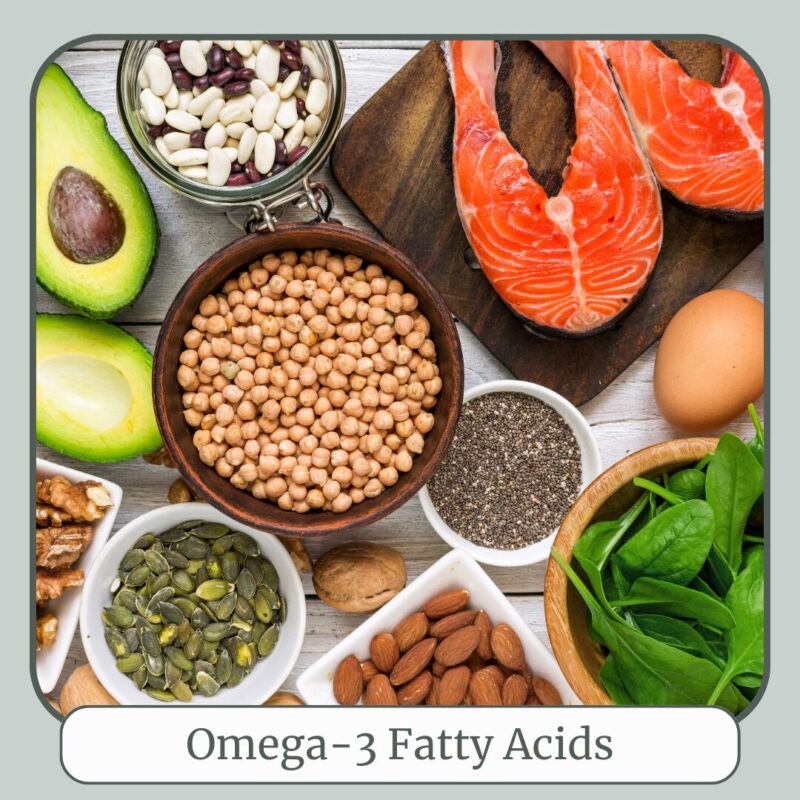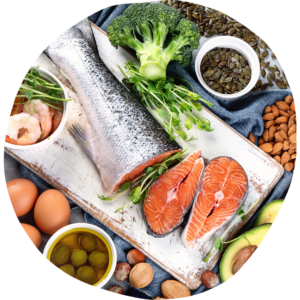When we talk about Omega-3 fatty acids, many people already know the basics: they’re essential for brain health, and they come from fatty fish like salmon. But what if we told you there’s more to Omega-3s than meets the eye? At Cypress Counseling & Wellness, where we combine holistic care with cutting-edge science like fatty acid testing, we often find that even those familiar with nutrition are surprised by some of the lesser-known benefits and applications of these essential fats.
Table of Contents
The Essentials: What You Need to Know About Omega-3 Fatty Acids for Brain and Mental Health
Omega-3 fatty acids are among the most well-researched nutrients for mental health and brain function. They come primarily in two forms:
- EPA (eicosapentaenoic acid): Known for its anti-inflammatory properties, EPA is particularly effective for reducing symptoms of depression and improving brain health. It works by lowering chronic inflammation, which is often linked to mood disorders.
- DHA (docosahexaenoic acid): DHA is critical for maintaining brain structure—specifically the neuronal membranes essential for cognitive function. Without sufficient DHA, the brain's ability to communicate and process information is compromised, which can affect mood and mental clarity.
Omega-3 fatty acids are essential because the body can't produce them on its own. You must obtain them through food or supplements, but not all sources of Omega-3 are equal. For example, plant sources like flaxseeds contain ALA (alpha-linolenic acid), an Omega-3 precursor, but the body converts ALA into EPA and DHA inefficiently. This is why fatty fish sources are more potent for directly boosting brain and mental health.
The Nutrient in Action: Omega-3 Fatty Acids for Mental Health
Omega-3 fatty acids play a multi-faceted role in promoting mental health. While many people focus on the cognitive benefits, Omega-3s also affect mood regulation, inflammation, and the gut-brain axis.
1. Mental Health and Mood Disorders
- EPA for Depression: EPA's ability to reduce brain inflammation makes it particularly effective in combating depression. Studies, including a 2019 meta-analysis, show that EPA-dominant Omega-3 supplements are more effective than DHA at improving mood, especially in individuals diagnosed with major depressive disorder.
- Cognitive Function: DHA, on the other hand, is essential for maintaining the integrity of brain cells. DHA is a primary structural component of the brain's grey matter, making it vital for memory, learning, and emotional regulation.
2. Balancing EPA and DHA: Ratios Matter
When supplementing Omega-3 fatty acids, it's crucial to focus on the balance between EPA and DHA. A 3:2 ratio of EPA to DHA has been found to yield optimal mental health benefits, particularly in reducing symptoms of depression and anxiety. Many commercially available Omega-3 supplements don’t achieve this ratio, so it’s important to choose wisely.
In contrast, the modern Western diet is often heavily skewed toward Omega-6 fatty acids (found in processed foods and vegetable oils). This high Omega-6 to Omega-3 ratio (often 20:1 in the typical American diet) exacerbates inflammation and increases the risk of mood disorders like anxiety and depression. Striving for a 4:1 Omega-6 to Omega-3 ratio is ideal for maintaining overall mental and physical health.
3. Omega-3s and the Gut-Brain Axis
Omega-3s aren't just for the brain—they also play a significant role in the gut-brain axis, a bi-directional communication system between the gut and the brain. New research shows how the gut microbiome affects mood and cognition, and Omega-3 fatty acids are essential for supporting a healthy gut, which in turn influences mental health:
- Modulation of Gut Bacteria: Omega-3s foster a healthy balance of gut bacteria, reducing systemic inflammation and improving mood regulation. Certain species of gut bacteria thrive in Omega-3-rich environments, contributing to the production of serotonin, a neurotransmitter associated with feelings of well-being and happiness.
- Strengthening the Gut Lining: Omega-3s help maintain the gut barrier, preventing “leaky gut,” which can trigger inflammation in the brain and body. A stronger gut lining reduces the risk of mood disorders like anxiety and depression.
4. Neurotransmitter Production
Omega-3s also directly affect neurotransmitter production, especially serotonin and dopamine. Since about 90% of serotonin is produced in the gut, a healthy gut environment fueled by Omega-3s has direct benefits for emotional regulation and mental resilience.
Omega-3s and Disease-Fighting Properties
In addition to their impact on mental health, Omega-3 fatty acids have powerful disease-fighting properties. Their anti-inflammatory effects extend beyond mental health, offering protection against chronic conditions rooted in inflammation:
- Heart Disease: Omega-3s are well-known for reducing the risk of cardiovascular disease. EPA and DHA lower blood pressure, reduce triglycerides, and improve overall heart function. Regular intake of Omega-3 supplements is linked to a lower risk of heart attacks and strokes.
- Autoimmune Diseases: Omega-3s may help regulate the immune response, benefiting individuals with autoimmune conditions like rheumatoid arthritis, lupus, and multiple sclerosis. By reducing inflammation, Omega-3s can alleviate symptoms and slow disease progression.
- Cancer Prevention: Emerging research suggests that Omega-3s may reduce the risk of cancers such as breast, prostate, and colorectal cancer. The anti-inflammatory and immune-modulating effects of EPA and DHA help inhibit tumor growth.
- Alzheimer’s Disease: DHA plays a crucial role in protecting the brain against age-related cognitive decline. Studies show that higher DHA intake is linked to a lower risk of developing Alzheimer's and other forms of dementia.
Top 10 Food Sources of Omega-3 Fatty Acids
 Wild-Caught Salmon – Rich in both EPA and DHA.
Wild-Caught Salmon – Rich in both EPA and DHA.- Mackerel – A fatty fish with high Omega-3 content.
- Sardines – Small fish packed with Omega-3s and easy to add to meals.
- Chia Seeds – A top plant-based source of Omega-3s, especially for vegans.
- Flaxseeds – High in ALA, a plant-based Omega-3 precursor.
- Algal Oil – A sustainable, vegan-friendly source of DHA and EPA.
- Walnuts – Another plant-based option high in ALA, great as a snack.
- Hemp Seeds – Rich in ALA and Omega-6 fatty acids, making them versatile.
- Cod Liver Oil – A supplement rich in Omega-3s as well as vitamins A and D.
- Herring – Another fatty fish loaded with EPA and DHA, ideal for brain health.
How to Choose an Omega-3 Supplement: A Guide
When it comes to boosting your Omega-3 intake, supplements can be an excellent option, especially if you're not getting enough from your diet. But with so many choices available, selecting the right Omega-3 supplement can feel overwhelming. Here's what to consider:
1. EPA to DHA Ratio
The effectiveness of Omega-3 supplements largely depends on the balance of EPA and DHA. For mental health, a supplement with a 3:2 ratio of EPA to DHA is often recommended. EPA is especially helpful for reducing symptoms of depression and anxiety, while DHA is essential for cognitive function and brain health. Always check the label to ensure the right balance for your needs.
2. Fish Oil vs. Algal Oil
- Fish Oil: Most Omega-3 supplements are derived from fish oil, which is high in both EPA and DHA. It’s an excellent option if you're looking for a potent source of Omega-3s. When choosing fish oil, look for products that are third-party tested for purity to ensure they are free from heavy metals and contaminants like mercury.
- Algal Oil: If you’re vegan or vegetarian, algal oil is a great alternative. It’s the only plant-based source that contains DHA and EPA. While it can be more expensive, algal oil is also more sustainable and avoids the environmental concerns associated with overfishing.
3. Triglyceride vs. Ethyl Ester Form
Omega-3 supplements come in two forms:
- Triglyceride form: This is the natural form found in food and is more easily absorbed by the body. It’s considered superior in terms of bioavailability.
- Ethyl ester form: This is a processed form of Omega-3, which is less expensive but not as easily absorbed. Whenever possible, opt for supplements in the triglyceride form for better absorption and effectiveness.
4. Dosage and Concentration
The total amount of Omega-3s you need depends on your health goals. For mental health, it's generally recommended to take 1,000-2,000 mg of combined EPA and DHA per day. Check the label for the breakdown of EPA and DHA—some supplements may be more concentrated, meaning you can take fewer capsules to meet your needs.
5. Sustainability and Sourcing
Look for supplements that are certified by organizations like Friend of the Sea or Marine Stewardship Council to ensure that the fish used were caught sustainably. Overfishing is a growing concern, and choosing sustainably sourced Omega-3 supplements helps protect marine ecosystems.
6. Enteric Coating
Some Omega-3 supplements come with an enteric coating, which can prevent "fishy burps" by ensuring that the capsules don’t dissolve until they reach the intestines. This is more of a preference but can make taking fish oil more comfortable for some people.
7. Quality and Purity
Always choose high-quality supplements that have been third-party tested for purity. Omega-3 supplements can be contaminated with heavy metals, PCBs, and other toxins. Reputable brands will offer testing information and certifications on the label, indicating that the product meets safety standards.
8. Vegan and Vegetarian Options
If you're vegan or vegetarian, make sure to choose an Omega-3 supplement made from algal oil. This is the best plant-based source of EPA and DHA, offering a sustainable and ethical alternative to fish oil.
Recommended Omega-3 Dosages:
- For general brain and heart health: 1,000 mg of combined EPA and DHA per day
- For mental health and mood regulation: 1,500-2,000 mg of combined EPA and DHA per day, with an emphasis on EPA for reducing depression and anxiety symptoms
Get Your Fix: 3 Delicious Omega-3 Recipes
1. Meat Recipe: Grilled Wild-Caught Salmon with Lemon Herb Quinoa
- Ingredients:
- 2 wild-caught salmon fillets
- 1 cup cooked quinoa
- 1 tablespoon olive oil
- 2 tablespoons lemon juice
- Fresh parsley or dill, chopped
- Salt and pepper to taste
- Directions:
- Preheat the grill to medium-high heat. Season the salmon with olive oil, lemon juice, salt, and pepper.
- Grill the salmon for about 5-7 minutes per side until fully cooked.
- Serve with a side of quinoa tossed with fresh herbs and a squeeze of lemon juice.
2. Vegetarian Recipe: Quinoa and Walnut Salad
-
Ingredients:
- 1 cup quinoa

- 1/2 cup walnuts, chopped
- 1 avocado, diced
- 1/2 cup edamame, shelled
- 1/4 cup flaxseeds, ground (or chia seeds)
- 1/2 cup spinach, roughly chopped
- 1/4 red onion, thinly sliced
- 2 tablespoons olive oil
- Juice of 1 lemon
- Salt and pepper to taste
Directions:
- Rinse the quinoa and cook according to the package instructions (typically 1 cup quinoa to 2 cups water, simmering until the water is absorbed).
- While the quinoa cooks, toast the chopped walnuts in a dry pan over medium heat for 2-3 minutes until lightly golden.
- In a large bowl, combine the cooked quinoa, toasted walnuts, avocado, edamame, flaxseeds (or chia seeds), spinach, and red onion.
- In a small bowl, whisk together the olive oil, lemon juice, salt, and pepper. Pour the dressing over the quinoa mixture and toss to combine.
- Serve chilled or at room temperature.
- 1 cup quinoa
3. Vegan Recipe: Chia Seed Pudding with Fresh Berries
- Ingredients:
- 1/4 cup chia seeds
- 1 cup almond milk (or other plant-based milk)
- 1 teaspoon vanilla extract
- 1 tablespoon maple syrup (optional)
- Fresh mixed berries (strawberries, blueberries, etc.)
- Directions:
- Combine chia seeds, almond milk, vanilla extract, and sweetener in a jar or bowl. Stir well.
- Let it sit in the fridge for at least 4 hours (or overnight) to thicken.
- Top with fresh berries before serving for a refreshing, nutrient-dense treat.
-

Rachel Plympton, LCSW, brings 14+ years of expertise to her mission of creating lasting, whole-body wellness. Using a dynamic blend of Play Therapy, Cognitive Behavioral Therapy, Mindfulness, EMDR, and Safe and Sound Protocol™ (SSP), she helps clients break through barriers and achieve meaningful change. Rachel also offers Wellness Panels that reveal powerful insights into the link between mental and physical health. Whether working with children, teens, or adults, Rachel is dedicated to guiding her clients in transformation and resilience.
View all posts
 (281) 305-9387
(281) 305-9387











